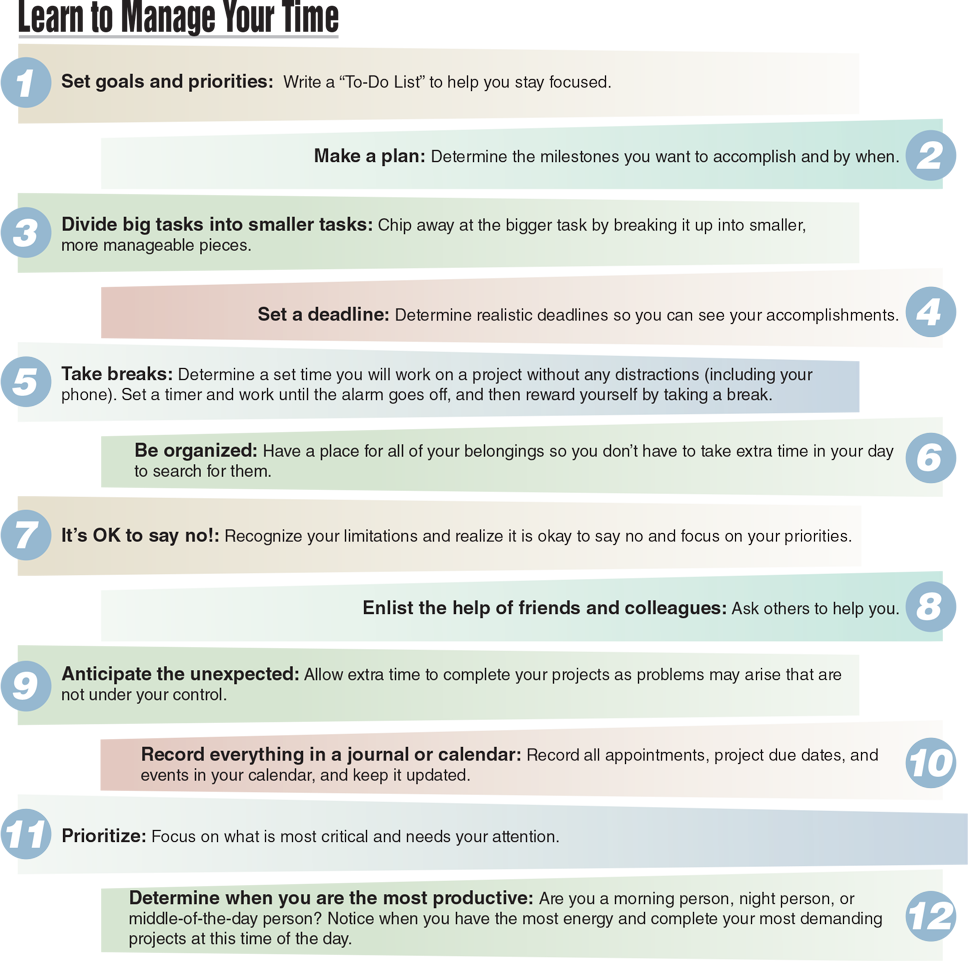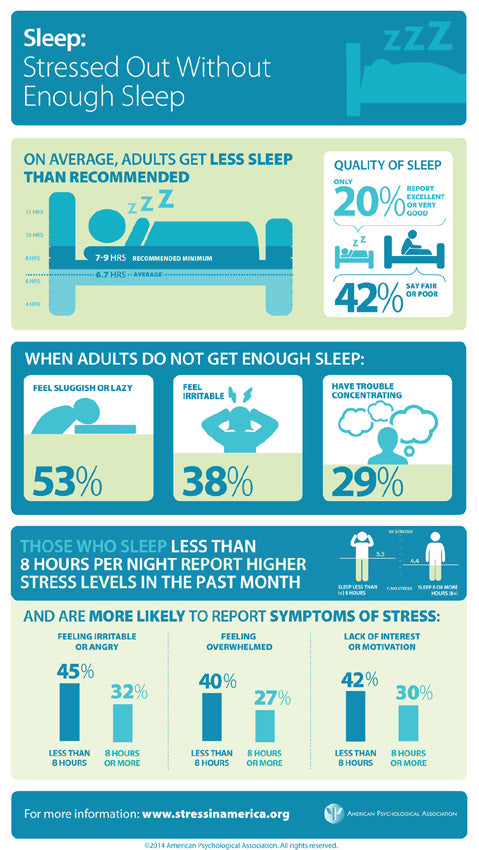Key Stress-Management Strategies
This is an excerpt from Fitness and Well-Being for Life 2nd Edition With HKPropel Access by Carol K Armbruster,Ellen M Evans,Catherine M Laughlin.
Because we all have stressors in our lives, and there are times when these stressors are more significant and debilitating than others, it’s important to learn how to put these life events into perspective and to have a coping plan in place. Like stressors, strategies for managing stress are personal. One tactic may help you more than your roommate, and some strategies will work better for combatting certain stressors than others. The primary stress-management strategies are summarized next.
Exercise and Physical Activity
As this textbook describes in detail, exercise and physical activity have many benefits for your health, including your mental health. Exercise can help you manage stress and anxiety and is used to help prevent or treat mild depression (U.S. Department of Health and Human Services 2018). Many modes of exercise are important, but most of the research on stress management is focused on cardiorespiratory activity. Regular daily movement of at least a moderate intensity can prevent the “check engine” light from going on (i.e., prevent stress from getting out of control). You can also temporarily increase the amount of exercise you do when you are facing a short-term stressor, such as during finals week.
Fuel Your Body
Stress can have effects on dietary intake (Sapolsky 2004). Coping by eating for comfort—typically by overconsuming calories or increasing your intake of foods with more added sugars, saturated fats, and sodium—is often termed stress eating. When pressured for time, you may take in excessive caffeine, which can increase stress and anxiety in both the short and long term. Conversely, many people have a reduced appetite in response to stress, which can lead to low blood sugar. People also commonly skip breakfast due to stress, which can then cause low blood sugar during prime productive hours in the morning. Stress hormones can also cause your blood sugar to be less balanced, which can further contribute to stress levels. Making healthy fuel choices throughout the day is therefore important to help you manage stress (see chapter 8 for more information on nutrition).
Social Support
Social support is also a primary strategy for reducing your response to life’s stressors. Being supported as well as being a support to others in times of need reduces the stress response, especially to psychological stressors (Sapolsky 2004). It is important to get social support from the right person, the right network of friends, and the right community. (We all know people who would increase our stress response if we asked them for help!)
Instead of placing the management of friendships, which take time and energy, into the “fun” category, start thinking of these activities as a health behavior. Fostering new friendships, maintaining established relationships, and investing effort to keep family connections healthy are all critical to your health. College presents opportunities to join many different clubs and organizations, ranging from church, sports, political, and volunteer experiences. Many of these are offered as registered student organizations at your institution. Finally, if you are struggling with relationship issues or are suffering from loneliness, most campuses offer counseling services for free or at a reduced cost. Good relationship skills are an important investment in your health. Invest in yourself.
Relaxation Techniques and Meditation: Quieting the Mind
Relaxation techniques often combine breathing and focused thoughts and images to calm the mind and the body. Common examples of relaxation response techniques are biofeedback, deep breathing, guided imagery, progressive relaxation, and self-hypnosis. Mind and body practices, such as meditation and yoga, are also sometimes considered useful for relaxation (National Institutes of Health 2022). When performed on a regular basis, meditation has been shown to reduce the negative effects of psychological stress (Goyal et al. 2014) and to reduce stress hormones (Sapolsky 2004).
Many different types of meditation exist, but most are focused on adopting positive and affirming thoughts. Two common methods are mindfulness meditation and Transcendental Meditation. Mindfulness meditation reduces psychological stress and the stress response by learning how to be mindful of the present moment, as opposed to thinking about the past or future. Transcendental Meditation emphasizes using a mantra, which is a word or phrase that is repeated to reach a point where your attention is no longer focused on the distressing thoughts.
Managing Your Life and To-Do List
Setting goals and priorities to keep you organized and prepared can help you manage your stress level. Oversleeping, running late for class, and rushing through your morning will almost certainly cause a stress response. Arriving to class and realizing that you forgot about the exam scheduled for that day will cause your cortisol levels to increase. Consciously thinking through what must get done and what can wait for another day so you can prioritize your work and your rest is critical. Time management means successfully and efficiently prioritizing and scheduling one’s time. Figure 10.6 illustrates steps that might offer some insights to increase your skills in managing your time and your life. Recall that the top challenge reported by college students is procrastination. How can you avoid procrastination? If you are struggling to find solutions, campus resources include trained professionals who can help you identify causes and workable solutions to reduce procrastination habits.

Managing Stress Through Sleep
Not only can the stress response can cause sleep disturbances, but lack of quality sleep greatly increases the stress response to life’s challenges. For optimal health, it is important to make sure you get the quantity and quality of sleep you require to function properly. In today’s society, regular, good-quality sleep is often thought of as a luxury reserved for days off. Your sleep behaviors are just as important for your health and academic performance as your diet and physical activity behaviors.
Sleep Quantity and Quality
As figure 10.7 depicts, sleep is an important health behavior, and many people struggle to get enough quality sleep (Watson et al. 2015). College students need 7 hours or more of sleep per night; however, the amount of sleep a person needs varies, especially with age. Infants, children, and adolescents need the most sleep. Most adults require 7 to 8 hours per night. However, some people function well on 5 hours, whereas others need 10 hours of sleep to feel their best (American Sleep Association n.d.).

Reprinted from American Psychological Association. www.apa.org/Images/2013-sia-Sleep-Infographic-1024_tcm7-166594.jpg
Beyond quantity, uninterrupted (i.e., not fragmented) sleep is also very important for sleep quality so that each of the five stages of sleep can be experienced, especially stages 3 and 4 and REM (rapid eye movement) sleep. Typically, if uninterrupted, a healthy sleeper will pass through all five stages of sleep in a cycle of 90 to 110 minutes, with the length spent in the stages changing through the night (American Sleep Association n.d.).
- Stage 1 sleep:
- Light sleep occurs.
- You drift in and out of sleep but can be awakened easily.
- Your eyes move slowly, and muscle activity slows.
- You often experience a sense of falling or muscle spasms or jerks.
- Stage 2 sleep:
- Your eye movements stop.
- Your brain waves become slower.
- Rapid brain waves occur occasionally.
- Stages 3 and 4 sleep:
- In stage 3, slow brain waves appear called delta waves.
- By stage 4, delta waves are the only brain waves.
- Stages 3 and 4 are deep sleep with no eye or muscle activity.
- If awakened, you are groggy and may be disoriented.
- REM sleep:
- Your breathing becomes rapid, irregular, and shallow.
- Your eyes jerk rapidly in random directions.
- The muscles in your arms and legs become temporarily paralyzed.
- Your heart rate increases, and blood pressure rises.
- If awakened in this stage, you may recall bizarre or illogical dreams or thoughts.
If you feel drowsy during the day, you likely are not getting enough sleep. If you routinely fall asleep within five minutes of lying down, you likely have major sleep deprivation (American Sleep Association n.d.). Inability to fall asleep or stay asleep and sleep disorders such as sleep apnea are also a concern.
Therefore, it’s important to get regular sleep instead of skipping sleep for many days and then planning to catch up on weekends or holiday breaks (figure 10.7). An excellent sleep resource is the American Sleep Association (www.sleepassociation.org). Speak with your personal physician if you are concerned about your sleep patterns.
Thirty-three percent of the U.S. population reports being chronically sleep deprived, which is regularly sleeping for less than 7 hours in a 24-hour period (Centers for Disease Control and Prevention 2020).
Health Risks Associated With Poor Sleep
Regular, good sleep is essential for optimal health and a high quality of life. Without it, we experience adverse physical and mental consequences. These include an increased risk of accidents, injuries, cardiovascular and metabolic diseases, and mental health afflictions such as anxiety and depression. Lack of sleep also negatively affects mental alertness and focus and contributes to poor behavioral choices in general. Chronic sleep deprivation stimulates the stress systems, contributing to allostatic load. If you have poor sleep habits, you are at risk of developing numerous chronic health conditions that will negatively affect your life, now and in the future (American Sleep Association n.d.; Watson et al. 2015).
Strategies for Enhancing Sleep and Energy Levels
Like most health behaviors, sleep is a habit. Therefore, having good sleep habits can help you get a good night’s sleep on a regular basis. The chapter 10 labs on HKPropel will help you assess your sleep quantity and quality and craft a personal plan for getting the sleep you need. The following main considerations will help you explore your sleep habits. For more detailed information, visit the sleep education site of the American Academy of Sleep Medicine (2020).
- Be consistent: Get up and go to bed at about the same time every day. This includes weekends, holidays, and breaks from school.
- Make sure your bedroom is cool (not too hot), peaceful, and quiet. Your mattress and pillows should be comfortable.
- Install dark curtains or blinds over your bedroom windows or wear an eye mask.
- Make your bedroom a screen-free zone. Do not share your bed with your computer and cell phone.
- Eat small meals before bedtime and resist the temptation to have pizza, tacos, and other spicy foods a few hours before bed. Some foods can cause indigestion, or acid reflux, which worsens when lying down.
- Limit your caffeine in the late afternoon or early evening (this includes chocolate and energy drinks) and limit alcohol and other fluids before bed to reduce the chances of having to use the bathroom during your sleep cycle.
- Get more physical activity during the day to help you fall asleep more easily at night.
- Talk to your health care provider about any medications you are taking and their effect on your sleep. You may be able to take medications that cause drowsiness before bed so you can stay awake for class and sleep at night.
SHOP

Get the latest insights with regular newsletters, plus periodic product information and special insider offers.
JOIN NOW


